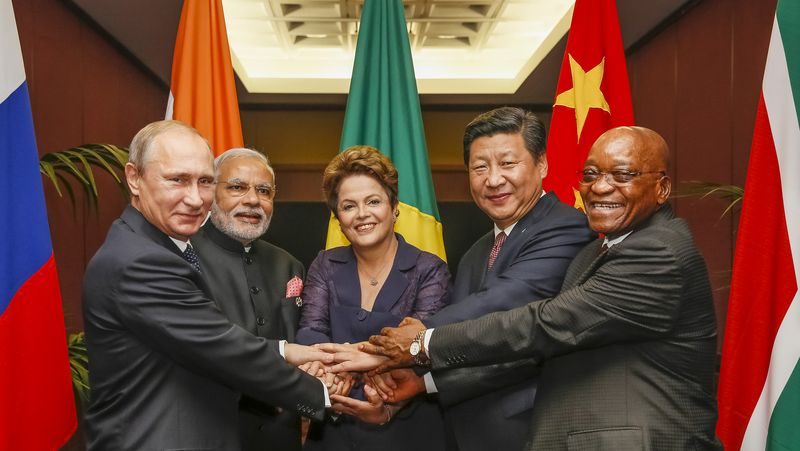
Global Governance and Transnationalizing Capitalist Hegemony
By Ian Taylor
Abingdon: Routledge, 2017
Ian Taylor’s new book provides a sceptical account of the rise of emerging powers and the BRICS in particular. The argument is on the whole a convincing one, namely that for all the talk of the rise of the BRICS, and the threat to US hegemony, global capitalism and the (neo-)liberal international order, in fact the BRICS are a product of the globalization of capitalism and this liberal international order. Moreover, as beneficiaries, albeit unequal ones, they are hardly likely to challenge it. Taylor does an excellent job in taking the reader through these arguments and the book is highly recommended – and the critical comments below are ones that are made by a reviewer very sympathetic to his overall argument.
Taylor makes these arguments through challenging the idea that these new and supposed emerging powers represent a state capitalist alternative to neoliberal capitalism (pp.13-17). Instead, one cannot explain the rise of these countries without examining the making of a global capitalism, and the links— both competitive and cooperative—between global elites or what he calls, following William I. Robinson, the transnational capitalist class. Thus in terms of international institutions of global governance, these new powers essentially want a bigger slice of the cake, but they do not want to change the cake itself; that is, they essentially support the liberal international order, but just want more of a say in it (see Chapter 3). Taylor goes on to argue (Chapter 4) that the talk of emerging powers is a fad, a phase that will pass, and he does a good and convincing job in showing the limits of the rise of these powers, and the problems faced by some of them. This includes China’s slowdown and debt problems as well as over-production in a number of sectors, Brazil and Russia’s recent economic problems, and the limits of India’s growth ‘miracle’. Above all, the last three years have seen significant commodity price declines or static growth, and this has put the wider rise of the South in context – though this is an issue that is not explored in any great depth by Taylor. Perhaps most ironically, Goldman Sachs, the company whose former employee Jim O’ Neill coined the term the BRICS, recently closed down its BRICS investment fund.
All of this puts the arguments about a rising South, global convergence, and the decline of the West into some kind of perspective. Much discussion of the rise of the BRICS has drawn too easily on either zero sum theories of international relations (varieties of realism in essence) or on neoliberal arguments that the BRICS have emerged because of market friendly, neoliberal policies. Both of these arguments are rejected by Taylor, but in terms of dealing with the latter argument, we might point to some possible weaknesses in his account. For while Taylor is correct to point to the problems of neoliberalism (exploitation, global hierarchy and marginalisation, the continued significance of the state not only as a market actor), in arguing that the emerging powers are simply part of the liberal international order, he is in danger of falling back on the argument that the BRICs have been success—within limits—because they are part of the world market.
In fact, while the state capitalist thesis is problematic as Taylor points out, it is also the case that the integration of say, China into the liberal international order is not only an unequal one, it is also uneven and contested. Thus, while China has drawn on an export led strategy in labour intensive goods, and is particularly export-dependent, it exists alongside a strategy of limiting foreign investment in some sectors and building national champions. This then is in some respects a state capitalist development strategy, while at the same time one that does not challenge the liberal international order, but equally one where integration is selective.
This leads to the second issue, which is the rise of China and the BRICS in the South. Taylor is right that China is not presenting a state capitalist or ‘Beijing Consensus’ alternative to the post-Washington Consensus, not least because a more globalized and open international economic order is still one where the US and the post-Washington Consensus remains dominant. Moreover, for all its rhetoric, China is no friend of the South and essentially wants raw materials in exchange for the purchase of its own manufacturing products. But at the same time, Chinese aid is different from that of the more conditional western version, and while it is still in many respects ‘neo-colonial’, it is an alliance of convenience for African and other elites.
These changes need to be put into the context of the hierarchies in the neoliberal international order, and indeed the key role of the United States in that order, as discussed by writers like Leo Panitch, Sam Gindin and Sean Starrs. Thus for example, corporate ownership and power is globalized, but it is American companies that have led this globalization process. If this is transnationalization, then it is an uneven one and different from the level playing field envisaged by neoliberalism and third way politicians, but equally by those Marxists who talk of a relatively straightforward transnational capitalist class. This point reflects a certain ambiguity in Taylor’s work, which is quite where US hegemony fits into his overall argument. That this question is so important is all the more topical today, for it may well be that, as Taylor so effectively reminds us, the emerging powers are not a challenge to this hegemony, and in fact the main challenge to that hegemony may now be residing in Washington in the form of the President of the United States.